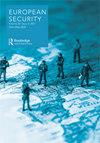The underlying causes of strategic surprise in EU foreign policy: a post-mortem investigation of the Arab uprisings and the Ukraine–Russia crisis of 2013/14
IF 3.6
2区 社会学
Q1 AREA STUDIES
引用次数: 0
Abstract
ABSTRACT The study of why and when governments are caught out by strategic surprise has been a major occupation of intelligence studies, international relations, public administration and crisis management studies. Still little is known, however, about the structural vulnerabilities to such surprises in international organisations such as the European Union (EU). EU institutions themselves have not undertaken rigorous investigations or public inquiries of recent strategic surprises, instead relying on internal review processes. In order to understand the most common underlying problems causing surprise in the EU context, this paper adapts and tests insights from the strategic surprise literature. It elaborates a theoretical framework with five hypotheses about why the leadership of EU institutions has been prone to being caught by surprises in foreign affairs: limitations in collection capacity, institutional fragmentation of policymaking, organisational culture, member state politicisation, and cognitive biases arising from collective ideas and norms. These hypotheses are tested using a post-mortem approach investigating two significant strategic surprises: the start and spread of the Arab uprisings of 2010/11 and Ukraine–Russia crisis of 2013/14.欧盟外交政策出现战略意外的根本原因:对2013/14年阿拉伯起义和乌克兰-俄罗斯危机的事后调查
对政府为何以及何时陷入战略意外的研究一直是情报研究、国际关系、公共行政和危机管理研究的一个主要领域。然而,对于欧盟(EU)等国际组织在这种意外情况下的结构性脆弱性,人们仍然知之甚少。欧盟机构本身并没有对最近的战略意外进行严格的调查或公开调查,而是依靠内部审查程序。为了了解在欧盟背景下导致突然性的最常见的潜在问题,本文对战略突然性文献的见解进行了改编和检验。它详细阐述了一个理论框架,其中包含五个假设,以解释为什么欧盟机构的领导层在外交事务中容易遭遇意外:收集能力的限制、政策制定的制度分裂、组织文化、成员国政治化,以及由集体观念和规范引起的认知偏见。这些假设是通过事后分析的方法来检验的,该方法调查了两个重大的战略意外事件:2010/11年阿拉伯起义的开始和蔓延,以及2013/14年乌克兰-俄罗斯危机。
本文章由计算机程序翻译,如有差异,请以英文原文为准。
求助全文
约1分钟内获得全文
求助全文

 求助内容:
求助内容: 应助结果提醒方式:
应助结果提醒方式:


